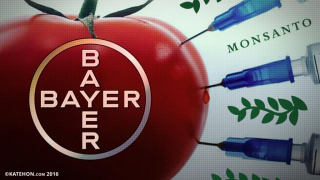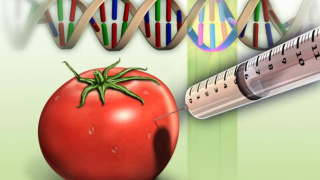Cancer due to weed remedies: Why farmers are suing Bayer
Last week, another scandalous lawsuit against the biotech company Bayer on the case of the impact of the most popular herbicide in the world - Roundup - on the health of those who use it in its work, has been submitted to the US federal court.
The claimant was Californian farmer Edwin Hardeman. It is reported that this is the second of at least eight thousand pending lawsuits due to problems with the Roundup in the United States. Earlier, in 2018, school gardener from California, Duane Johnson, sued $ 289 million from Monsanto. A jury of the San Francisco District Court acknowledged that the chemical led to a severe oncological disease - non-Hodgkin's lymphoma. Later, the judge reduced the amount of the payment to $ 78 million, which Johnson has not yet received, since the company filed an appeal.
According to Biosafety.ru, Bayer executives (who now owns the herbicide manufacturer Monsanto) reported that the court’s verdict did not affect the demand for glyphosate-containing herbicides and seeds.
If the jury in the new process agrees that it was “Roundup” that led to the emergence of the same non-Hodgkin's lymphoma in Hardeman as in Johnson, the next step will be to present the court with facts that Bayer influenced decision makers, and also on scientists who have conducted a study of the herbicide for safety for the environment and health.
Who provides the result?
Roundup is massively used in agriculture. It is known that more than 70% of all transgenic plants grown in the world are resistant to the glyphosate chemical, on the basis of which the Roundup herbicide was created. And of course, all studies of both the chemical itself and GMOs resistant to it, the results of which the company makes, showed its complete safety.
In February, the reviewed scientific journal Archives of Toxicology published the results of the glyphosate-resistant NK603 Monsanto maize study. It is reported that neither culture nor glyphosate itself have any effect on experimental animals. Scientists investigated the same corn, about which in 2012, independent French experts under the leadership of Gilles-Eric Séralini obtained completely different results - the organs of rodents were deformed, animals developed serious diseases. After the publication of data against Séralini, a powerful information campaign was launched by lobbyists, but hundreds of scientists from all over the world stood up to protect it by signing an open letter.
The new study, which revealed no problems in experimental animals, was conducted under the guidance of Pablo Steinberg from the Institute of Food Toxicology and the University of Veterinary Medicine of Hanover, Germany.
Steinberg is also a member of the scientific council of the Danone Institute in Munich. In addition, he co-authored three other scientific papers paid for by the well-known lobbyist structure of the International Life Science Institute (ILSI), which includes Bayer, Dow, DuPont and other large biotechnological companies. This is indicated in the “Conflict of Interest” section of an article on another transgenic corn, the research team of which was also led by Steinberg.
GMO - a venture to increase sales of herbicides
Against this background, in February, a landmark article by Eric Kobayashi-Solomon was published, where he says that most GM plants produced and consumed in the US today are soybean, corn, and sugar beet that are resistant to the herbicide “Roundup” from Monsanto. They were modified to prevent them from dying by spraying with glyphosate (the scientific name for the weed killer Roundup).
Kobayashi-Solomon writes that Roundup did not pass a safety check for humans and other mammals. Consequently, the longer it is on the market, the more it has a negative impact on the health of the soil and leads to a decrease in the fertility of plants. Also, by eating GM plants that are resistant to Roundup, animals may not receive the necessary micronutrients. And it was these plants that could be the cause of the mass death of bees, the value of which, as Kobayashi-Solomon notes, should not be underestimated.
According to the author, it would be much more important to redirect the gigantic funds spent on the production of glyphosate-resistant transgenic plants for selection and hybridization. In the future, genetic engineering could also benefit agriculture, but certainly not in the form of crops resistant to chemicals.
What else is known about Roundup?
According to EcoWatch, US scientists decided to check the urine of the inhabitants of the country for the content of glyphosate. The result - in 93% of people who passed the test, it was found.
In 2012, university researchers in Germany discovered glyphosate in the urine of urban residents. According to the Argentine press, regular studies show the presence of glyphosate in the urine of citizens of this country. Canadian researchers in 2011 found one of the metabolites of this substance in the blood of pregnant women.
In the same 2011, American scientists discovered glyphosate in surface waters, rainwater and in the air in the Mississippi River Basin - Iowa and Mississippi states, the results were published on the US Geological Review.
Argentine scientists have been arguing for more than a year that it was glyphosate that led to fetal intrauterine defects in women living in areas of mass cultivation of GMOs that are resistant to Roundup.
Herbicide penetrates the human body not only through food, where its residual content can significantly exceed the norms adopted before the introduction of GMOs (in the case of soybean grain in the United States and the European Union - almost 130 times). When it is plentifully sprayed over fields, for example, with GM corn or soybeans, it gets into rivers, groundwater, on the surface of roadsides, on city pavements.
Of course, replacing the world's most sold herbicide, which is contained in Roundup and other glyphosate-based products, will not work out overnight. But it is also impossible to dismiss new data. Otherwise, a situation similar to the story with the insecticide DDT may occur. It was also considered safe for a long time, until it was banned as a carcinogen in most countries of the world.










